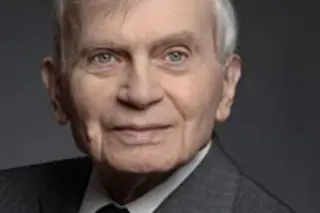French physicist Bernard d'Espagnat has won the annual Templeton Prize with its purse of $1.4 million; the prize is often given to scientists who find common ground between religion and science.
Professor d'Espagnat, 87, worked with great luminaries of quantum physics but went on to address the philosophical questions that the field poses [BBC News].
Physicists may be more open to seeing a higher power behind the great mysteries of the universe than scientists in other disciplines:
Including Dr. d'Espagnat, five of the past 10 Templeton winners have been physicists or have had strong connections to the discipline [The Christian Science Monitor].
The thrust of d'Espagnat's work was on experimental tests of Bell's theorem. The theorem states that either quantum mechanics is a complete description of the world or that if there is some reality beneath quantum mechanics, it must be nonlocal – that is, things can influence one another ...














